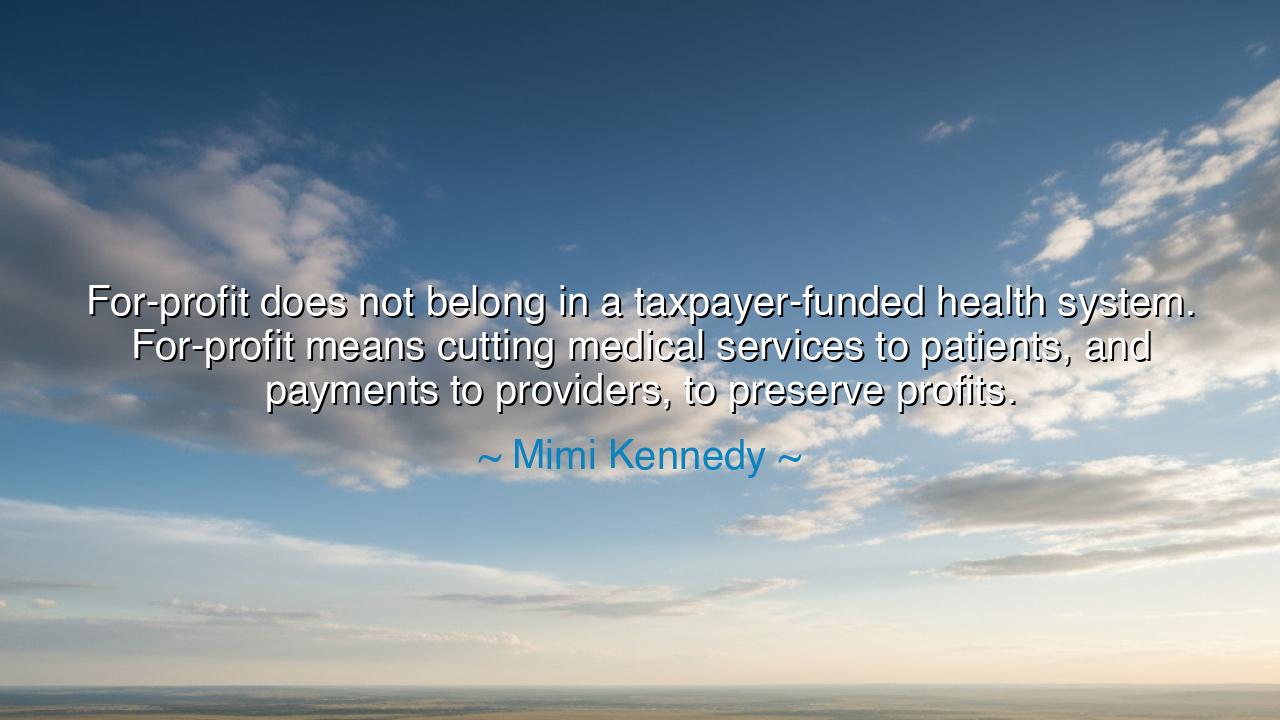
For-profit does not belong in a taxpayer-funded health system.
For-profit does not belong in a taxpayer-funded health system. For-profit means cutting medical services to patients, and payments to providers, to preserve profits.






When Mimi Kennedy declared, “For-profit does not belong in a taxpayer-funded health system. For-profit means cutting medical services to patients, and payments to providers, to preserve profits,” she gave voice to an ancient and enduring truth: that the healing of the sick is sacred work, and when profit intrudes upon it, compassion is corrupted. Her words burn with indignation, for they remind us that medicine, when reduced to the calculations of the marketplace, risks ceasing to be medicine at all.
The first truth in her words is that health systems funded by taxpayers belong to the people. They are created not for the enrichment of merchants, but for the preservation of life. To insert for-profit motives into such a system is to divert the sacred flow of resources from the patient to the shareholder, from the healer’s hands to the treasurer’s vault. Kennedy warns that this diversion inevitably comes at a cost: diminished services for those who suffer, and diminished support for those who serve. It is the substitution of gold for humanity.
History reveals this lesson in vivid colors. In the days of ancient Rome, the grain dole—the annona—was a public provision to ensure the poor had bread. When merchants controlled it, they withheld grain to raise prices, and famine haunted the streets. But when the state administered it as a public good, the people were fed, and unrest subsided. So too with medicine: when entrusted to profiteers, care becomes scarce, withheld, or rationed; but when entrusted to the public trust, it nourishes all, regardless of wealth.
Her words also unveil the danger of cutting services and payments in the name of efficiency. To the profiteer, a hospital bed is a cost, a nurse is an expense, a treatment is a liability. But to the patient, that bed is salvation, that nurse is comfort, that treatment is life. Here lies the chasm between the logic of profit and the logic of compassion: one seeks to minimize cost, the other to maximize care. Kennedy’s warning is that when profit rules, the sacred duty of medicine bends under its weight.
Consider the example of Florence Nightingale, who in the Crimean War transformed hospitals not for profit, but for humanity. She demanded cleanliness, ventilation, and dignity for soldiers, saving thousands of lives. Had her mission been driven by profit, such measures—costly and resource-heavy—would have been dismissed. Yet her legacy endures, because she placed human life above financial calculation. This is the spirit Kennedy calls us to remember: that health is not a commodity to be bought and sold, but a human right to be defended.
The deeper meaning of Kennedy’s words lies in the defense of justice and trust. When citizens fund a system with their taxes, they do so in trust—that the system will serve them in their hour of need. To betray this trust for profit is to break the covenant between people and their commonwealth. And when such a covenant is broken, cynicism and despair take root, corroding the very foundation of society. Thus, her warning is not only about medicine, but about democracy itself.
For us, the lesson is clear: guard against the intrusion of profit where compassion must reign. In your communities, demand transparency in health systems. Support leaders who place patients above shareholders. Speak out when services are cut, when providers are squeezed, when life itself is weighed against the balance sheet. In your own life, cultivate the courage to place humanity above gain, so that in your dealings—whether great or small—you embody the principle that care is sacred.
Thus, Mimi Kennedy’s words ring like a trumpet across time. For-profit and public trust cannot share the same throne. One demands sacrifice for the many, the other demands sacrifice of the many for the few. Let us then heed her warning, and commit ourselves to a future where medicine remains what it was always meant to be: an act of mercy, a defense of dignity, a service not to wealth but to life itself.






AAdministratorAdministrator
Welcome, honored guests. Please leave a comment, we will respond soon